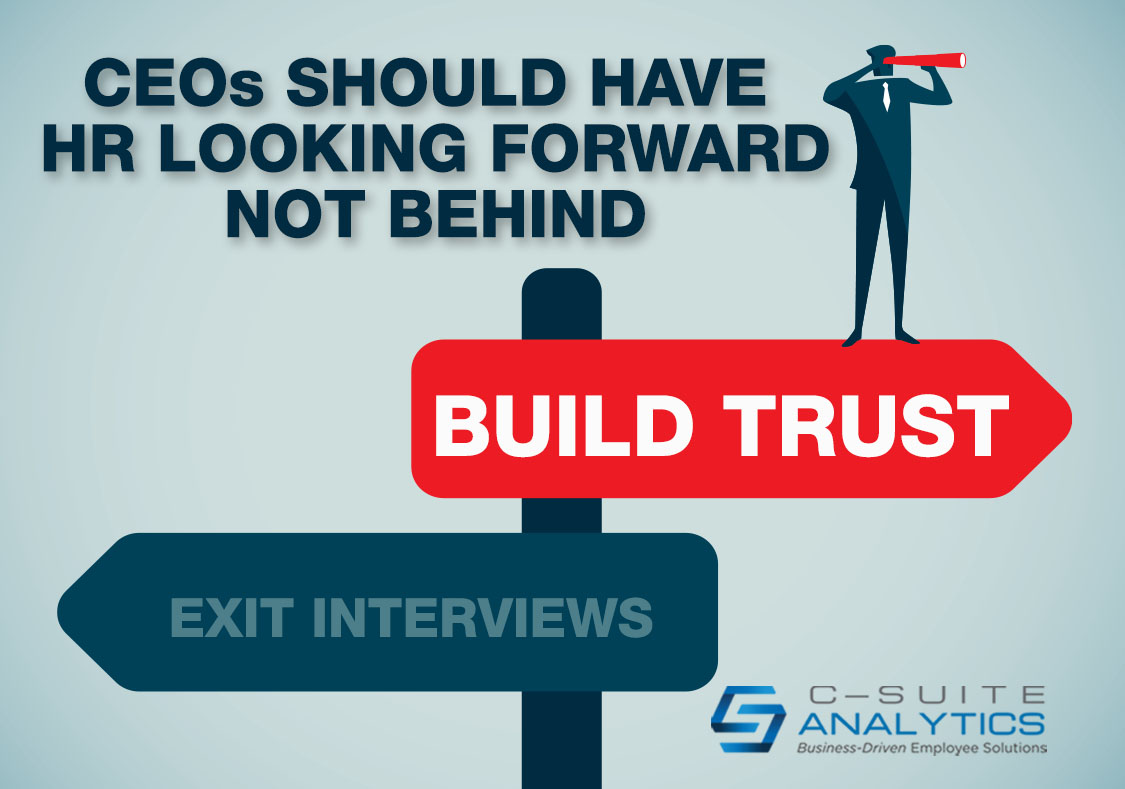At SHRM Talent Conference 2024 I asked the room this question: Who here has ever heard of one manager getting fired for a low employee engagement survey score? Please raise your hand if you can think of even just one. The only sound was the 400-plus attendees turning in their seats to see if anyone raised their hands. There were no hands up.
Attention CEOs: Help Your HR Professionals Save 20 Hours Each Month

How? Stop doing exit interviews. Never waste your time again asking an employee why she’s leaving. Never analyze a vendor’s data regarding why your employees leave. Never compile data into a report to tell your top team why your employees are quitting. Never report the top 5 reasons why employees quit ever again.
Exit interviews are a sham. Whoever developed this idea did so in good faith because the theory makes sense. Ask employees why they leave, fix what they tell you, and fewer employees will leave. Simple enough. But here are their flaws, and there are so many, and some are so severe that there is no reason the resuscitate exit interviews to make them better. You can’t.
- Many employees don’t tell the truth as they are either too nice or won’t burn bridges.
- Studies tell us that once an employee says, “I quit”, their credibility tumbles so their words mean less so improvement actions don’t happen.
- Managers who conduct exit interviews and select the leave reason are reluctant to check “Manager” on the form.
- Executives are tired of reading “pay/recognition/communication/career development” on periodic reports when they believe programs are in place to fix these things…except maybe pay.
- And most importantly, even if the leave reasons are right, we’ve all learned that knowing why people leave does not necessarily lead to solutions.
Our regular readers know we consistently help companies cut turnover by 30% and more, and when new clients offer us their exit interview data we politely say, “No thank you”.
Instead, start with this much-proven assumption, that the #1 reason employees quit jobs is because they don’t trust their boss. Now go back to those past reports that list lack of recognition, poor communication, no career coaching, and recognize that their solutions are selecting better bosses and building their skills. The common response to poor recognition is to implement employee-of-the-month/employee appreciation week/give service award clocks/have recognition luncheons. For communications we make CEO videos/schedule town hall meetings/pump up the company intranet. For career development we host career day.
How much do employees care about employee-of-the-month awards? There is a short-term good feeling if they win…and either no feeling or a bad feeling if they lose. Or more meetings? Or career day? Or for that matter, any event with food?
Gallup tells us employee engagement in the U.S. has hardly budged in 20 years, and just a third of our employees are engaged. Yet Deloitte reports we spend $1.53 billion in our country each year to improve engagement. Where does that money go? How can we possibly flush away so much for zero return? The opening hint is surveys…exit surveys, engagement surveys…that drive one-size-fits-all programs. How can those programs make a dent in retention or engagement when the #1 reason employees stay or leave…or engage or disengage…is how much they trust their boss?
Our work here deals in data, but this is just a hunch. If you want to know how to solve engagement and retention, fix what employees talk about over dinner. When the person across the table asks, “How was your day, dear?”, no one talks about having pet insurance or their company’s most recent event with food. They instead talk about their boss, their colleagues, and their job duties. This is the box we must address in order to help them stay longer and engage more.
How positively your employees talk about their days over dinner tells you everything you need to know about your supervisors’ leadership styles. Good leader, trust-building leader? Happy dinner talk. Jerk boss? Bad dinner talk.
If employee disengagement and turnover were considered as an illness, enabling supervisors to build trust with their teams would be the vaccine. You can learn how to administer that vaccine here, https://c-suiteanalytics.com/solutions/comprehensive-turnover-solution/
In a future blog, I’ll address another HR habit that you should toss which is engagement and turnover benchmarks.
Please email your comments to me at DFinnegan@C-SuiteAnalytics.com. You are also welcome to forward this blog to anyone you believe would find it helpful.



